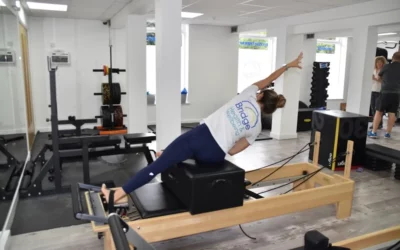
Sciatica is a condition involving pain and sometimes weakness down the back of the leg into the foot. The sciatic nerve is the largest nerve in the human body. It forms from the nerve roots of L4-S3 in the spine. The presentation of sciatica can vary from patient to patient. It can come on over time or very suddenly and can be quite mild to extremely severe. It is not uncommon to have very minimal back pain and severe leg symptoms, despite it being a back-related condition.
What causes sciatica?
The most common cause of sciatica is an issue with the discs in the lower part of the spine. The disc can become damaged and protrude which causes compression of the nerve. Depending on where the nerve is affected and the size of the protrusion will have a bearing on how significant the legs symptoms are. Inflammation from the spinal joints, infection, significant trauma and spinal malalignment can also cause sciatic symptoms.
What are the symptoms?
There are number of different symptoms that can present with sciatica. The most common ones are:
- Pain – usually from the buttock region down the back of the leg into the foot. You can also feel back pain
- Numbness
- Pins and needles
- Muscular weakness
- Gait dysfunction
How can we treat it?
There is no gold standard intervention for the treatment of sciatica. Initially, a thorough examination and assessment is carried out to rule out any serious pathology. Following this, we follow a conservative treatment process. This usually involves some hands-on physiotherapy work, progressive mobilisation and strengthening exercises and most importantly, a significant amount of patient reassurance, education and involvement in the process of treatment goal setting.
Should conservative measures not make enough progress, we might consider using modalities like acupuncture and even epidural injections. In some cases, the symptoms don’t respond or are severe enough to warrant surgery which involves removing the protruding piece of disc. This, in effect, releases the pressure on the nerve and allows it to start working normally again, helping you get back to health.
To speak to our physiotherapist Paul about your sciatica or book your physiotherapy appointment at our health and wellness centre on Bridge Street in Christchurch, Dorset, please contact us on 01202 473800 or email info@bridgehw.com.

Paul O’Connell (MSC, BSC, HCPC, MCSP) is a physiotherapist with two decades of clinical expertise. He has worked right across the UK, from North Yorkshire and London to Hampshire and Dorset. Sports medicine is one of his areas of special interest: he has worked both on the touchline and in sports injuries clinics, and now lectures on the Sports Therapy programme at Bournemouth University. Having spent several years managing physiotherapy and health assessment teams in two key Nuffield Health hospitals, Paul also has an extensive understanding of orthopaedic surgery.



